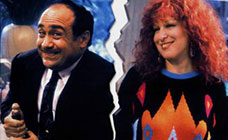|
|
|
|
Ruthless People
|
 |
|
Ruthless People is a
comedy that starts in hyperreal (i.e., Jerry Lewis’ The Ladies Man [1962])
territory. For a while you figure the only chuckles are going to come from the
101 Interior Design Jokes, the queer look-a-like quality of several cast
members (particularly Bill Pullman as quasi-De Niro), and the unsubtle play-off
between the disgusting viciousness of Danny De Vito/Bette Midler and the naïve
dreaminess of Judge Reinhold/Helen Slater.
Agreeably
cartoon-like, this low-level laugh-machine then gets plugged into a mildly
symptomatic, curious thematic concerning our old friend capitalist intersubjectivity, of which the American mainstream
cinema cannot help but speak these days (cf., all from 1986, 9 ½ Weeks, About
Last Night, Nothing in Common): here’s another parable about the
relation between commodities and pleasures, the twin, streamlined drives for
sex and money, particularly centred on a practical (rather than ethical)
question of what it is to be ruthless (which is never the same thing across the
differential dynamics of time, place, situation, strategy).
Ruthless People, as written by
Dale Launer and directed by the Flying High team of Abrahams, Zucker
& Zucker, then turns out to be something qualitatively more than the sum of
these bits and pieces: it reveals some truly expert comic plot mechanisms (a
rare thing these days) that carry the film with energy and precision to its
conclusion.
The
plot starts, in fact not, where it seems to – with a man stepping into home
with a chloroform-soaked hankie to kill his wife – but with the coincidental
displacement of that scheme by a second: she has already been kidnapped. The
film is in the first place about a series of plots that keep radiating outwards
catastrophically but tying up coincidentally to aid, cancel or transform each
other (the wonderful scenes of ransom money handings-over).
In
the second place, the film is about the status of a plot’s displaced or stolen
object: what if that object changes or transforms itself? This is the case not
only Bette Midler (as Barbara the wife) – from fat to thin and from resistant
stake to complicit partner; but also with the killer dog that falls in love
with its prey.
In
the third place, it is about the calculation of knowledge in comic narrative –
knowledge here being always a (treacherous, faltering) matter of guesses,
anticipations and assumptions, none of which pay-off the way they should, since
they’re all wrong to begin with (as in the whole hilarious trajectory of the
videotape blackmail tool).
Ruthless People is not a major
film by any means – it has no aspirations to consciously address any theme, and
it hurls around none of the complex, dynamic, semantic velocities of Ron Howard’s Gung Ho (aka Working Class Man,
1986) – but it offers a pleasant and clever auto-reflection on the ways and
means of comic construction reminiscent of Alfred Hitchcock’s lovely Family
Plot (1976).
Oh, and it has two completely detachable scenes about selling hi-fi equipment, and these are the most delicious – and probably sociologically accurate – comic skits you’ll see in mid ‘80s Pop Cinema. MORE Jerry Zucker: First Knight © Adrian Martin October 1986 |
![]()